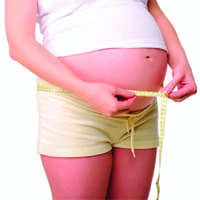More young women with health problems—including obesity, high blood pressure and prediabetes or type 2 diabetes—are getting pregnant than ever before. These problems can put both your health and your baby’s at increased risk for complications.
Conceive a healthy pregnancy
It’s best to enter pregnancy at a normal weight. Most women are overweight—2 out of 3 ages 15 to 44 and about 1 in 4 are obese, says the CDC. Check your BMI by using an online BMI calculator; aim for a BMI of 18.5 to 24.9.
All women considering pregnancy should get a health checkup prior to conceiving—what experts call preconception care. This is a medical checkup where your healthcare provider will help you with ways to eat healthy and exercise to assist in weight loss before you get pregnant. The American Association of Obstetrics and Gynecologists (ACOG) recommend obese women undertake a weight reduction program including diet, exercise and behavior modification before trying to conceive. Your provider will also help you understand how your weight affects both you and your baby, during and after pregnancy, including:
- The risks and complications during pregnancy.
- How obesity increases your risks of having a baby born with a neural tube defect, being born premature or stillborn (infant death) or too big for its gestational age.
Obesity complicates pregnancy
Being overweight or obese before and during pregnancy can put both you and baby at risk. As your weight increases, so do the chances of pregnancy complications, including:
- Bouts of obstructive sleep apnea (OSA)—more so than women with normal body weight.
- More heartburn and increased risks of hiatus hernia as abdominal pressure is greater when you’re obese.
- Increased risk for blood clots. Pregnancy raises your risks of blood clots, but even more so if you’re obese.
- Sudden blood pressure drops as increased fat around your abdomen compresses major vessels, creating a sudden drop in blood pressure when you rise from sitting, for example.
- Increased risk for developing for gestational diabetes.
- Increased risk for developing for preeclampsia. You may have preeclampsia in pregnancy if you have sudden headache, visual changes, rapid weight gain and swelling in your hands and face. This can be an emergency and you should report these to your healthcare provider right away.
Plan a healthy pregnancy
Pregnancy is an ideal time to begin or continue simple healthy behaviors, such as walking and eating healthfully. Aim for 30-60 minutes of activity most days of the week. Talk with your provider about any changes you plan to make during pregnancy to make sure they’re safe.
Don’t diet during pregnancy—some diets reduce important nutrients your baby needs for growth and health. Instead, get advice from a nutritionist to maintain a healthy weight during pregnancy. Visit the pregnancy and breastfeeding section of the choosemyplate.gov website for nutrition information. Follow your provider’s advice for healthy weight gain during pregnancy.
Get early and regular prenatal care. Go to every checkup, even if you’re feeling fine. Your provider will check your urine for early signs that you could be developing gestational diabetes, a urinary tract infection, if you’re at risk for high blood pressure or preeclampsia, and to see if you’re getting adequate food and liquids in your diet.
If you’ve ever had weight loss surgery, ask your healthcare provider if you need extra nutritional supplements to conceive and sustain a healthy pregnancy.
Weight Gain During Pregnancy
The experts at ACOG recommend that you decide with your provider how much weight you should gain in pregnancy. Here are the general guidelines:
| If your BMI is… | You’re… | Gain this much with 1 baby during pregnancy: | Gain this much with twins during pregnancy: |
| Less than 18.5 | Underweight | 28-40 pounds | No guidance for weight gain if you’re underweight with twins due to lack of enough data. Source: Institute of Medicine and National Research Council |
| 18.5—24.9 | Normal | 25-35 pounds | 37-54 pounds |
| 25.0—29.9 | Overweight | 15-25 pounds | 31-50 pounds |
| 30.0+ | Obese | 11-20 pounds | 25-42 pounds |
Obesity & Your Pregnancy
If you’re obese before you conceive, the CDC reports you:
- May struggle to get pregnant since you might not ovulate regularly.
- Are more likely to lose a pregnancy through miscarriage.
- Are more likely to develop gestational diabetes.
- Are more likely to have high blood pressure.
- Are more likely to deliver prematurely
- Are more likely to need an induction to start labor, which increases your risk for cesarean, which is major surgery.
- Are more likely to experience illness or death during or after pregnancy.






Comments are closed.